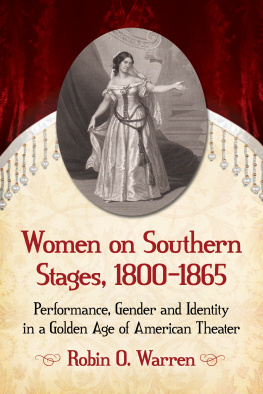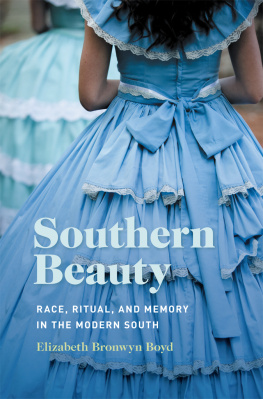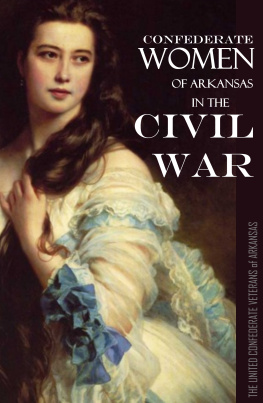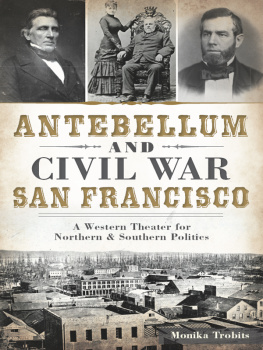
Women on Southern Stages, 18001865
Performance, Gender and Identity in a Golden Age of American Theater
Robin O. Warren

McFarland & Company, Inc., Publishers
Jefferson, North Carolina
e-ISBN: 978-1-4766-2648-2
LIBRARY OF CONGRESS CATALOGUING DATA ARE AVAILABLE
BRITISH LIBRARY CATALOGUING DATA ARE AVAILABLE
2016 Robin O. Warren. All rights reserved
No part of this book may be reproduced or transmitted in any form or by any means, electronic or mechanical, including photocopying or recording, or by any information storage and retrieval system, without permission in writing from the publisher.
On the cover: Mrs. Julia Dean Hayne as Juliet, print (image courtesy of author)
McFarland & Company, Inc., Publishers
Box 611, Jefferson, North Carolina 28640
www.mcfarlandpub.com
For Phoebe and Wally
Thou art all the comfort / The Gods will diet me with.
Imogen, Cymbeline, 3.4.17980, William Shakespeare
Acknowledgments
Writing this book has taught me that scholarship is a collaborative enterprise, and I have many colleagues to recognize for their help. While I was a graduate student at the University of Georgia, Christy Desmet, John Inscoe, and Frances Teague gave selflessly of their time to direct this project from its inception as a dissertation. I am grateful for their guidance and friendship.
Without access to the fine holdings in the following archives, this project would not have come to fruition. I appreciatively acknowledge the staffs and resources in each of these institutions: the John Hay Library, Brown University, the Digital History Center, Colonial Williamsburg Foundation, The David M. Rubenstein Rare Book and Manuscript Library, Duke University, the Special Collections and Archives, The Stuart A. Rose Manuscript Archives and Rare Book Library, Robert Woodruff Library, Emory University, the Free Library of Philadelphia, the Georgia Historical Society, the Houghton Library, Harvard University, the Historic New Orleans Collection, the Rare Book Room, Library of Congress, the Louisiana and Lower Mississippi Valley Collection, Hill Memorial Library, Louisiana State University, the Library and Research Center, Missouri History Museum, the New Orleans Public Library City Archives, the Billy Rose Theatre Division, the Jerome Robbins Dance Division, and the Miriam and Ira D. Wallach Division of Art, Prints, and Photographs, New York Public Library, the Hargrett Rare Book and Manuscript Library, the University of Georgia, the South Caroliniana Library, the University of South Carolina, the Special Collections Department, Howard-Tilton Memorial Library, Tulane University, and the Manuscripts, Archives, and Special Collections, Terrell Library, Washington State University.
I am especially thankful to the following archivists and employees who provided assistance with my research: Marianne Martin of the Colonial Williamsburg Foundation, Micah Hoggatt of the Harvard Theatre Collection, Jennifer Navarre of the Historic New Orleans Collection, Lynnette Stoudt of the Georgia Historical Association, Christina Bryant of the New Orleans Public Library, Jaime Bourassa, Christopher Gordon, and Christina Perez of the Missouri History Museum, Thomas Lisanti of the New York Public Library, Beth Bilderback of the South Caroliniana Library, and Cheryl Gunselman of the Terrell Library. I also appreciate James Sullivan for creating the map depicting the urban perimeter of the antebellum South.
I am grateful to Hugh Ruppersburg and Tim Powell for assisting with this project when I was a graduate student. Colleagues Monica Smith and David Hart have also long supported and encouraged me, and I treasure their ongoing friendship. Athens resident Peggy Galis acquainted me with William Henry and Eliza Crisp, antebellum and Civil War actors who became important players in this book. Peggy also introduced me to the Crisps descendent, Henry Crisp, who took time to answer questions about his forebears. I appreciate Mr. Crisps time and Peggys heart-felt interest.
My family has also lent great support to me during this process. My parents, Babs and Dwight Ogier, Jr., and my mother-in-law, Dede Callahan, have given ceaseless encouragement, and my sisters-in-law, Amanda Warren and Patricia Warren, have helped with my research. My daughter Phoebe has patiently endured the many hours that I have disappeared to research and write, and my husband Wally has not only given emotional support but also perceptive insights into my writing and research. For his confidence in me, his contributions to my academic endeavors, and for his love, I thank him.
Introduction
This book explores the theatrical repertory and daily performative roles of women who acted on the antebellum and Civil War southern stage. Theater scholar W. B. Worthen defines performativity as non-dramatic, non-theatrical, non-scripted, ceremonial, and everyday life performances. Southern actresses performed traditional stage scripts selected by white men, but they subverted accepted norms of femininity by performing in public and by exercising independence in their everyday lives.
In the nineteenth century, men and women were thought to have completely different natures, which suited them for different functions in what German sociologist Jrgen Habermas has called separate spheres. Their public positions kept them from being accepted and respected, even as they reinforced the prevailing feminine ideal on stage.
Aside from passing references in encyclopedias or small chapter entries in theater histories, early nineteenth-century southern actresses have received scant scholarly attention. Eliza Arnold Poe (17871811) and Adah Isaacs Menken (18351868) are exceptions, having serious academic biographies devoted to their lives. National stars such as Charlotte Cushman, Josephine Clifton, and Lotta Crabtree and international stars such as Mary Ann Duff, Clara Fisher, Ellen Tree Kean, and Fanny Kemble included southern theaters in their national tours, but a select cast of regional actresses gained prominence through their performances on southern stages. Their lives remain relatively unexamined, yet without actresses, there would have been no theaters, which were the primary form of public entertainment in the nineteenth century.
Larger cities in the early nineteenth century often supported more than one theater, and small towns attracted entertainers by converting taverns or barns into performance venues. Early stage histories and memoirs such as William Dunlaps History of the American Stage, Arthur Hornblows A History of the Theatre in America, H. P. Phelpss Players of a Century, Noah Ludlows Dramatic Life as I Found It, and Solomon Smiths Theatrical Management in the South and West for Thirty Years gloss womens contributions, while more recent histories such as Weldon Durhams American Theatre Companies, Oscar Brockett and Franklin Hildys History of the Theatre, and Garff B. Wilsons Three Hundred Years of American Drama and Theatre focus on theatrical trends, theater companies, or male managers.
In addition to examining the lives of Poe and Menken, this book gives the first detailed account of several leading southern stock actresses. Primary sources provided more information than previously published on Charlotte Wrighten Placide (17761823), Mary Maury Squires Ludlow (17931862), and Martha Matthews Smith (180231835), wives of managers who established theater in the antebellum South. These actresses made an important impact on the Old Souths cultural and social life in their conspicuous public positions. They acquired independence that few women during the early nineteenth century did, and they carved out in-between spaces for themselves in a profession dominated by men.
Next page







